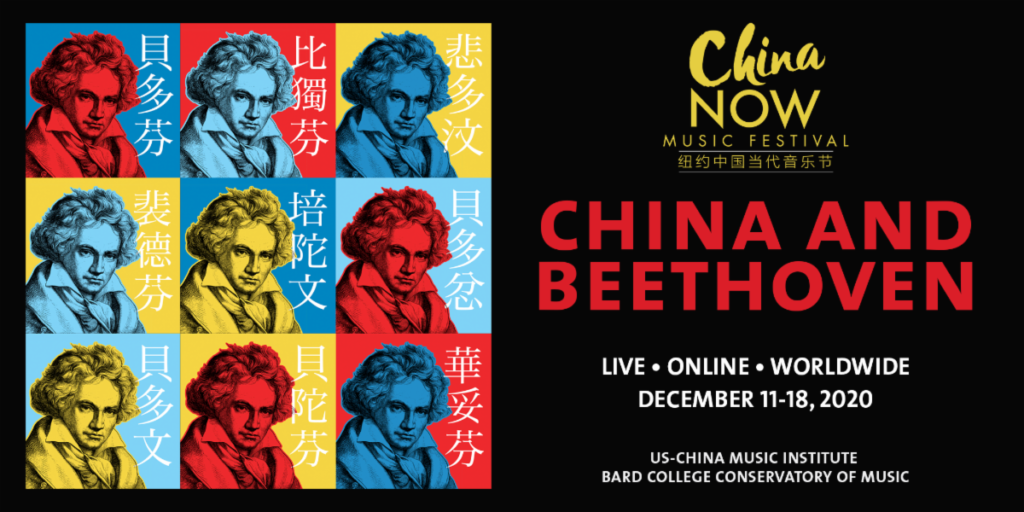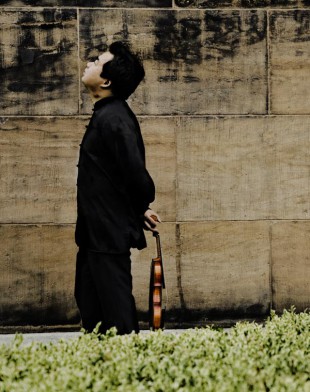
by Kevin T. McEneaney
This is the 250th year since the birth of Beethoven (1770-1827). Bard College celebrates that milestone with its link to China. China Now is a breathtaking review of the legendary master’s work as Beethoven’s reputation soars. While Confucius is considered THE Great Sage in China, others like Mencius, Lao Tzu, and the poet Du Fu, are also famous sages. Is Homer or Sophocles considered a great sage? No, and neither are Shakespeare, Goethe, or Tolstoy. Beethoven is the only Westerner who has that status; he is the Sage of Music.
Beethoven broke the artificial mold of the artist: he did not write merely for the court or critics, this Romantic hero wrote for the people, for everyone. Beethoven in China by Jindong Cai and Sheila Melvin charts the history of the influence of Beethoven in China.
Jindong Cai introduced Tuesday night’s stream from China which featured performances by the Shanghai Symphony Orchestra. In 1985 this orchestra performed the full cycle of Beethoven’s symphonies. They have performed Beethoven over 70 times, including Beethoven’s complete chamber music. This year the pandemic did not stop them as they performed with social distancing to 30% of audience capacity.
Under the baton of Yu Long the Shanghai Symphony opened with Symphony No. in F major, Op. 68, often called “Pastorale.” This composition remains a universal favorite, articulating the joys of nature with sunny disposition, perhaps the most cheerful work Beethoven ever wrote. The strings were ethereal in the first movement and Hu Zhe on flute stood out with bright tone in the second movement. The mischief of the Storm in the third movement contains a comic undertone with horns and drums. The unified ecstasy of final fourth movement can buoy one’s worldview for at least a week.
The second part of the concert was labelled “The Distant Beethoven” as if to emphasize the foreign locale of the classical composer who could work in the idiom of folk music. Mighty Hu Zhe on flute was accompanied by Zee Zee on piano for the charming “The Last Rose of Summer” and “Air Ecossais,” both seductive parlor room pieces. A quartet appeared to perform the last three movements of String Quartet No. 4 in C minor, Op. 18, which offered an example of work for the nobility. Huang Na played first violin like an exclamation mark! Shi Zhenyu on second violin displayed marvelous texture.
We were then back in the parlor by fireside with seven folk tunes, beginning with “The Soldier’s Dream,” which is thought to have been composed by Beethoven between 1788 and 1793 in his series of 25 Irish Songs, not published until 1814. The underlying tune is that of the famous “Londonderry Air” which was collected by Jane Ross of that county and published by George Petrie in 1855. Beethoven’s version of this popular folksong is, of course, far more sophisticated than its bar-room sister, “Danny Boy” written by English lawyer Frederic Edward Weatherly in 1910 and set to the tune in 1913.
The third part began with Violin Concerto in D major, Op. 61. Featuring Ning Feng as violinist, this performance nearly set the stage on fire. Ning Feng, who plays the 1710 Stradivari violin known as the ‘Vieuxtemps,’ is one of the great violin virtuosos on the globe. The audience exploded in rapturous ovation! I nearly swooned yet the concert was not over!
The fourth movement, “Ode to Joy,” from Symphony No. 9 in D minor, Op. 125 was yet to come and take the audience into the clouds. We landed in the heavens three hours after the concert opened! Beethoven had become the heavenly voice of humanity!
Now that China has recognized Beethoven as one of the Great Sages of Humanity, how long will it be until the United States begins to recognize that Beethoven was more than just a heroic Romantic composer but a hero of all humanity?
You can hear this concert for free by copying this link: https://www.youtube.com/watch?v=wOHDi_el-vs&feature=youtu.be
and follow the fantastic series online.
